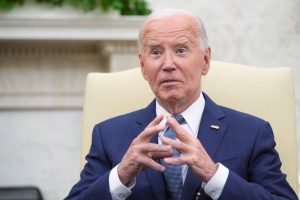
Witcher: Childcare costs ignored in presidential debates
After the June presidential debate, all anyone could talk about was President Biden’s health. There are legitimate reasons to be concerned about his mental acuity (for both political and governance reasons), but I was frustrated and concerned about something else — neither candidate seemed interested in addressing the problems that Americans face every day.
The issues that Biden and former president Donald Trump sidestepped were vast, but one stuck out to me — the price of childcare.
The two candidates’ non-answers on the issue were infuriating. CNN moderator Jake Tapper posed the question to Trump first, but the former president used his time to lambast Biden as the worst president ever and condemn him for not firing more people. He then got in some talking points about the botched withdrawal from Afghanistan and immigration before wrapping up by asserting that Biden is the “worst” president “in history by far.” Biden responded, perhaps justifiably, by defending himself and citing presidential historians who say Trump was the worst president in history.
This back-and-forth was exhausting. Does anyone really think Trump or Biden was worse than James Buchanan, who did little to prevent the Civil War? And further, does anyone think most parents care? They are likely much more concerned that the annual cost of childcare is $11,000 and makes up 10% to 15% of the typical family’s budget. Perhaps they are even contemplating leaving the labor force because they can’t find affordable and/or adequate care for their children.
To his credit, Biden did provide two sentences on childcare expenses. He suggested increasing the childcare tax credit and called for businesses to have more childcare facilities. Biden’s team must have been deeply disappointed because in April, the administration held meetings with the Small Business Administration to provide funding to “support the expansion of childcare delivery systems, increase childcare slots, and improve childcare access, affordability and quality.”
This is a significant pocketbook issue for many parents. As Tapper explained, childcare for two children is often more expensive for many families than their rent or mortgage payment. Biden thinks the answer comes from the top down. Trump appeared to be uninterested in the issue at all, which is unfortunate given his record on deregulation. So, what can be done?
Luckily, we don’t need the federal government to save us. Many answers to the problem of high childcare costs can be found at the state level. State governments have instituted numerous regulations to which childcare facilities must adhere. In most states, there is a square-footage-to-child ratio that must be followed. This raises the amount of space the facility must rent and, thus, the overhead for the business. Another common regulation is minimum teacher-to-child ratios that increase the labor costs of daycare facilities. Licensing requirements for childcare workers further contribute to the high cost.
Research demonstrates that these regulations, while well-intentioned, have had the effect of raising childcare costs without increasing the quality of care. Yes, you read that correctly: These seemingly common-sense regulations have not resulted in improved quality for our kids. Instead, they have arbitrarily restricted new entrants into the market and increased the cost for parents. Further research has found that these regulations decrease the diversity of childcare options and contribute to families having fewer children than they would like.
This is a significant problem. Yes, families desiring more children to fulfill the dream of a bigger family is a good thing. We should remove as many regulatory barriers as possible to empower families to achieve that end.
Too often, Americans look to Washington and the presidency to solve their problems. In many cases, the solutions they seek can be found much closer to home at the state or local level. In the case of rising childcare costs, part of the problem seems to be barriers established by state legislatures. Instead of relying on politicians in a distant capital, perhaps we should remove the existing regulatory barriers and see where that gets us.
Marcus M. Witcher is an assistant professor of history at Huntingdon College in Montgomery, Alabama/InsideSources


